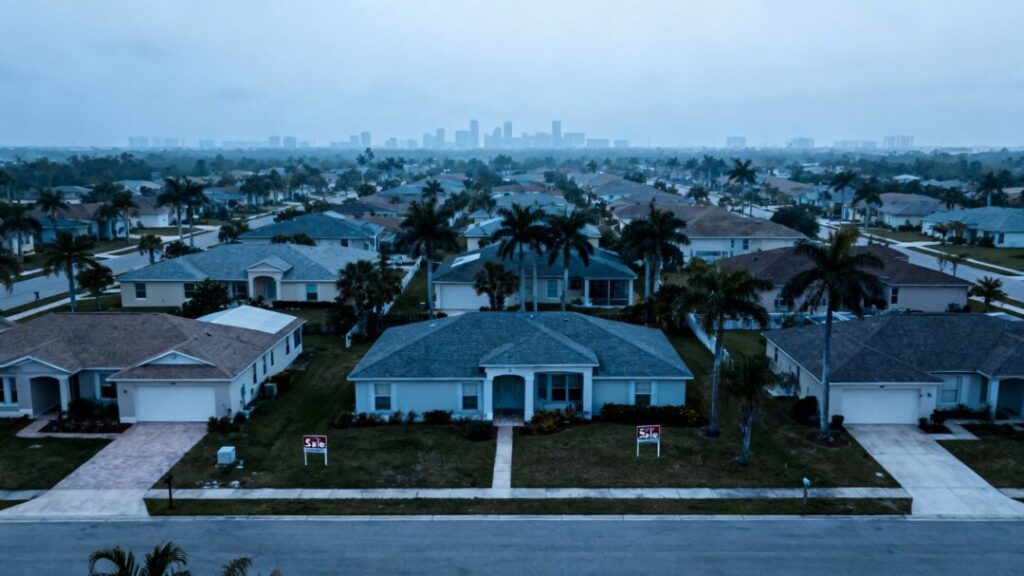Florida’s booming real estate market has hit a critical crossroads, with cities like Cape Coral, Lakeland, and other major metros facing sharply falling home prices and swelling inventories. Experts now warn that 2025 could bring the steepest declines since the last market crash, raising concerns for homeowners, buyers, and investors across the Sunshine State.
Key Takeaways
- Home prices in multiple Florida metros—especially Cape Coral and Lakeland—have dropped up to 19% year-over-year.
- Increasing inventory and affordability challenges are pushing the market toward a buyer’s advantage.
- Rapid appreciation during the pandemic has given way to market correction, particularly in high-growth and coastal areas.
The Signs of a Market Correction
Florida’s housing market—once the nation’s poster child for rapid post-pandemic appreciation—now faces a marked shift. In Cape Coral, the median home price sunk nearly 10% over the past year, while Naples’ median dropped a staggering 19%. Other metros such as Punta Gorda, Sebastian-Vero Beach, and North Port-Sarasota-Bradenton also report declines exceeding 10% amid rising inventories.
Economic headwinds, rising mortgage rates (almost 7% for 30-year fixed loans), and soaring insurance premiums have contributed to fewer buyers in the market and longer times to sell properties. For example, Cape Coral homes now spend an average of 76 days on market, up sharply from last year. Meanwhile, closed sales across Florida are down, with single-family homes seeing a 5.7% drop statewide in 2025.
Cities Feel the Impact: The Data
| Metro Area | Median Home Price (May 2025) | YoY % Price Change | Sales YoY Change |
|---|---|---|---|
| Naples-Immokalee-Marco Island | $767,800 | -19.2% | -15.3% |
| Punta Gorda | $325,000 | -14.5% | +1.7% |
| Cape Coral-Fort Myers | $375,000 | -9.6% | -1.6% |
| Lakeland | ~ $320,000* | -7% (est.) | Down |
*Exact Lakeland median not specified, but flagged as “second most risky market”.
Why Are Some Cities at Higher Risk?
Experts attribute the downturn to multiple factors:
- Pandemic-Fueled Price Surges: Cities that saw the biggest gains during the pandemic now face the largest corrections.
- Swelling Inventories: New listings outpace buyers, relieving upward pressure on prices and extending time homes remain unsold.
- Affordability Crisis: Escalating mortgage rates and insurance premiums have priced out many would-be buyers.
- Insurance and Natural Risks: Coastal and hurricane-impacted communities face especially sharp corrections due to rising costs and recovery challenges.
- Investor Retreat: As returns wane and risks rise, investor activity is down, removing a layer of support from the demand-side.
What Should Homeowners and Buyers Do Now?
- Sellers should adopt realistic pricing, work closely with local agents, and be ready for longer sales cycles and negotiations.
- Buyers have more options and bargaining power but should research insurance costs and market trends before making a move.
- Homeowners staying put should focus on financial preparedness and maintain perspective—long-term fundamentals for Florida remain strong despite the current correction.
The Road Ahead
While a crash on the scale of 2008 is not universally predicted, the risk of significant further price declines remains high in many Florida metros. The market is in correction, not collapse—a necessary recalibration after unprecedented growth. Local expertise and adaptability will be critical for navigating this new chapter in Florida real estate.
Sources
- Why is Cape Coral Housing Market in Florida Doomed to Crash in 2025?, Norada Real Estate Investments.
- Worst Florida Housing Markets Facing Steepest Price Declines in 2025, Norada Real Estate Investments.
- Lakeland, Florida is Second Most Risky Housing Market Poised for a Crash, Norada Real Estate Investments.
- 5 Florida Housing Markets At Risk of a Major Price Decline or Crash, Norada Real Estate Investments.
- 4 Florida Housing Markets Facing Worse Potential Crash Than Cape Coral, Norada Real Estate Investments.


